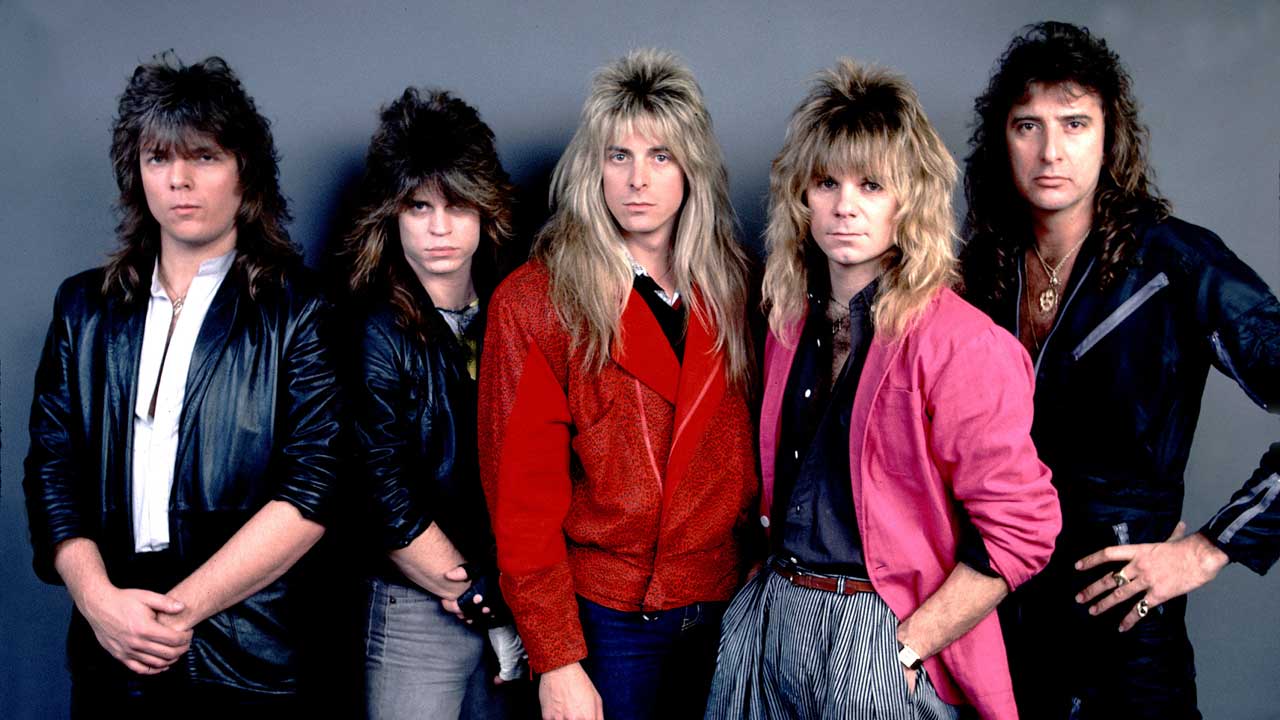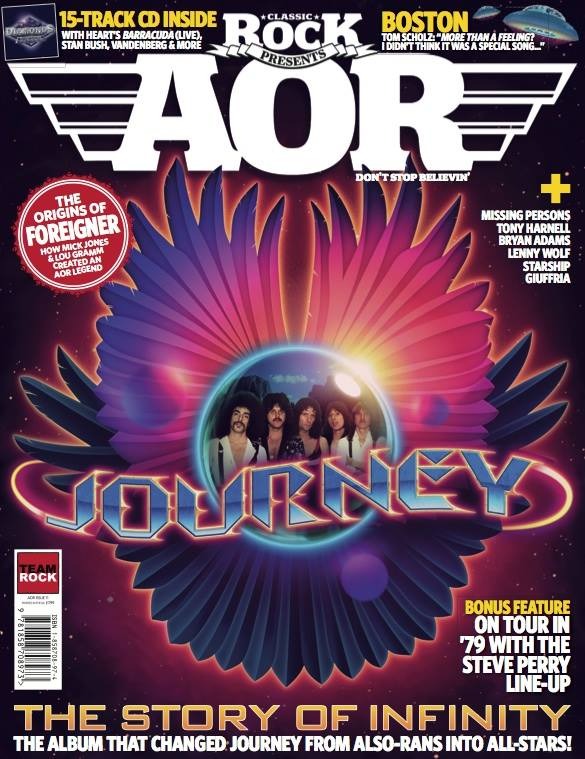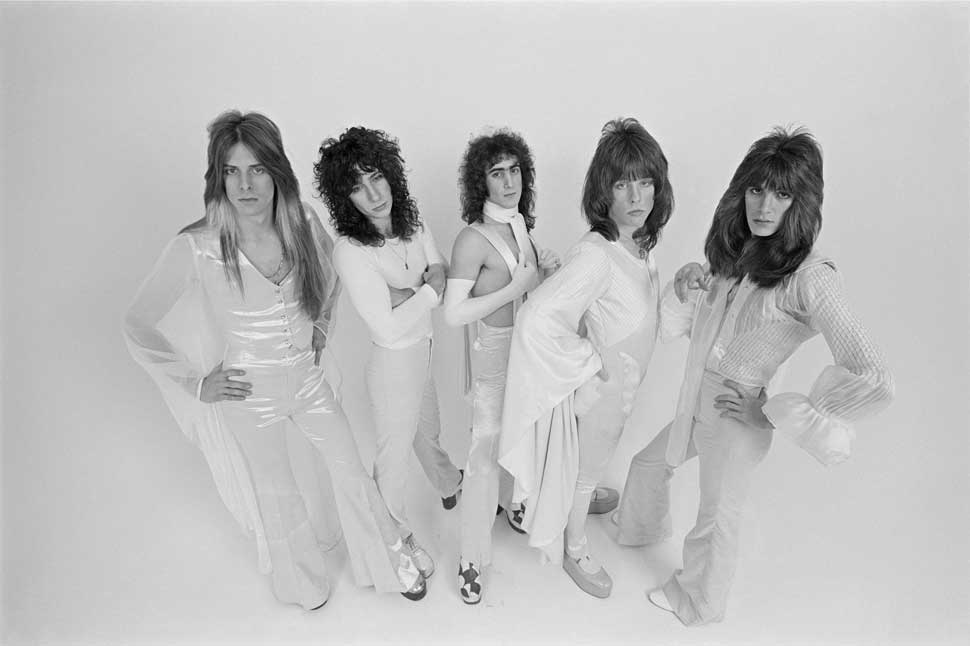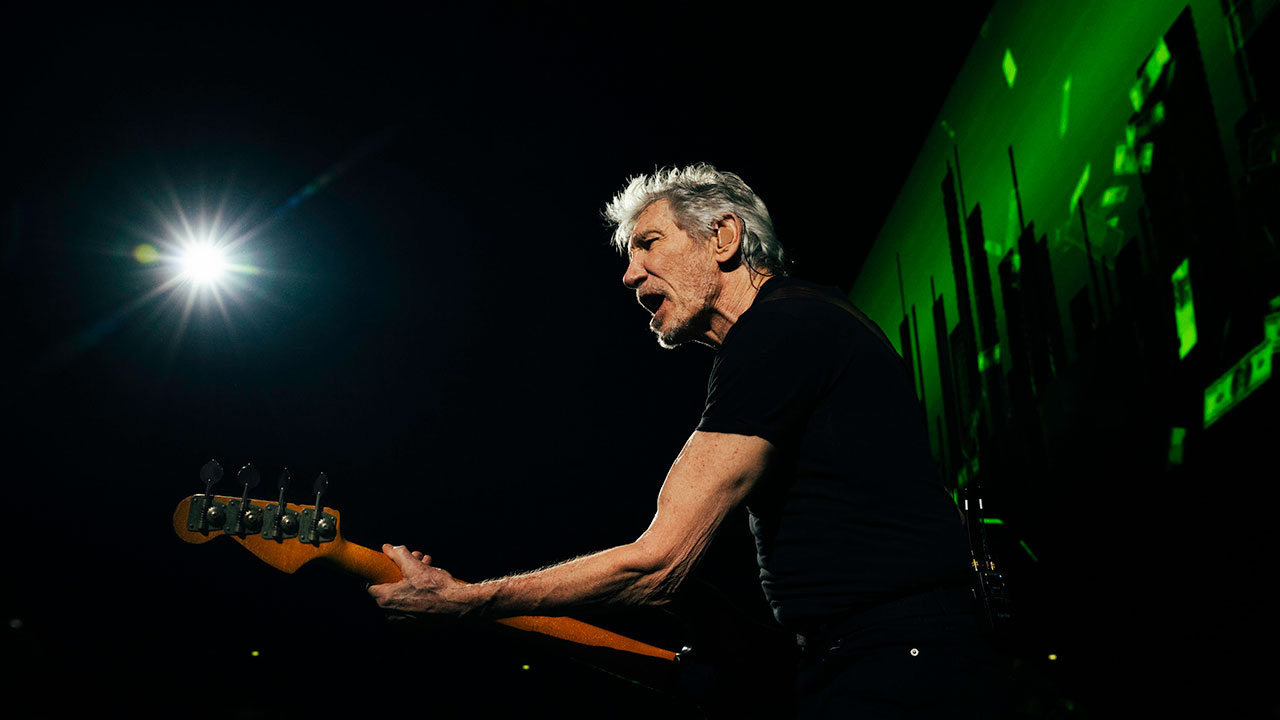"The record company should’ve offered counselling - we could've been the next Journey!" The high hopes and shattered dreams of melodic rock's nearly men, Giuffria
When cult rockers Angel broke up, Gregg Giuffria formed another band – and they could have been huge

Long before the coming of the internet, it was to the printed press that one would excitedly look for the latest music news. In the early 80s, Sounds and Kerrang! were unquestionably the go-to sources for music news in the UK, especially when it came to exclusives. And in May 1984, Kerrang! unleashed a peach of a scoop: the return of Angel!
Angel’s keyboard maestro Gregg Giuffria had, Kerrang! revealed, put together a brand new line-up of the group and was in LA’s Cherokee Studios with producer Andy Johns working on demos of such quality that a major deal was all but assured.
After Neil Bogart had sold his Casablanca label to PolyGram in 1980, there was little appetite on the part of the five members of Angel to work with the new owners, and vice versa. However, the company refused to allow the group to leave for pastures new. When PolyGram turned down Angel’s request to have Jack Douglas produce a new studio album, it was only a matter of time before the whole thing fell apart.
Despite an initial determination by Giuffria – along with drummer Barry Brandt and legendary guitarist Punky Meadows – to carry on with new vocalist Dennis ‘Fergie’ Frederiksen (formerly with Trillion) in the place of Frank DiMino and ex-Babys bassist Ricky Phillips (who actually succeeded Rudy Sarzo) as a replacement for Felix Robinson, by 1982 only Giuffria and Meadows remained. Now joined by vocalist David Glen Eisley and using the name Legend, they worked on demos and shopped for a deal.

“Legend was only ever a working title,” recalls Gregg Giuffria – now a hugely successful Las Vegas businessman involved with casino gaming machines – today. “It wasn’t something we were ever going to keep.”
“I was gigging in different bands at the time, and someone had run into Gregg who was looking for a singer and gave him my number,” recalls David Glen Eisley, in a rare break from overseeing the acting careers of his wife Olivia Hussey and their daughter India Eisley. “Gregg called me out of the blue. So Gregg, Punky and I put something together. We wrote two or three songs in an afternoon and got on really well together. We did some demos but they didn’t go anywhere.”
“We were just fiddling around,” adds Gregg.
When Meadows decided to move back to Maryland, Giuffria and Eisley continued writing. “Gregg and I had formed a solid writing partnership and we decided to put a new band together.”
To this end they extended an invitation to Craig Goldy. At the time the guitarist was very much a part of the Ronnie James Dio-mentored Rough Cutt. “Gregg and David saw a Rough Cutt show at Santa Monica Civic and approached me to see if I was interested in what they were doing,” remembers Goldy. “Gregg showed me a video of what they had been doing with Legend, as I distinctly remember Punky Meadows was in the band playing on that tape. I had this vision of something really big happening if I joined them. But you have to understand the gravity of such a decision when you consider that, before I joined Rough Cutt, I was homeless, living with just my guitar in a car that wasn’t even mine.
“Ronnie James Dio was a hero of mine and the band was just about to sign to Warner Brothers, but I sensed what Gregg and David had going would be big. Once I was playing with these guys I knew I’d made the right choice, especially one day when Gregg and I were sitting in the studio and he started to play the piano. I was a big Deep Purple fan and was a bit of a musical snob. Here was a guy comparable with my hero, Jon Lord. I honestly didn’t know that Gregg, the guy from Angel, could play like that. Gregg is a musical genius.”

While David Glen Eisley wasn’t aware that Goldy had ever seen the Legend videos, he does recall why they were made. “They were conceptually horrendous, and were made as a favour to some university students who wanted to shoot some band stuff. We did a couple of songs, but the stuff was just weird and pretty horrible.”
Alan Krigger was playing in Beach Boy Carl Wilson’s band at the Greek Theatre in LA when he was scouted by Giuffria and Eisley. A seasoned professional, he’d begun his recording career back in Florida, where he cut a single and opened for Ted Nugent and Chuck Berry with his first band, a rock outfit called Savage. He then spent a decade playing in Ike & Tina Turner’s band. Krigger affirms: “Despite what you might read on the internet, there was no other drummer before I joined.”
Former Sabu bassist Rick Bozzo – who Eisley had known from his own stint with AOR legend Paul Sabu in the late 70s – completed the line-up. “We snuck into Cherokee Studios in LA and got some stuff down that was an embryonic state of what we wanted to do,” adds Eisley. According to Goldy, the band cut tracks with Lee DeCarlo (who had worked on Angel’s late-70s albums) and Andy Johns, with the tape made with the latter being the all-important set of tunes that would gain Giuffria a recording deal.
“We recorded four songs on that demo with Andy Johns,” states Alan Krigger, as he reads the titles from the pile of cassette tapes close to hand. “Don’t Tear Me Down, Lonely In Love, Do Me Right and Run For Your Life. That last track never made the album.”
The band members certainly have fond memories of working with Andy Johns, who would also gain a production credit alongside Giuffria on the debut album.
“Working with Andy Johns was great,” recalls Gregg, who tells an amusing tale – confirmed by Eisley – of an argument that developed with Johns over the turn of a console knob during the mix of a song. The argument ended with the pair trading blows, and David walking in to find Johns and Giuffria on the floor, with the latter in a headlock. “David asks: ‘Is this how records are made?’ And Andy says: ‘Yeah!’ I turned that knob up again without Andy knowing though!”
Although Giuffria and co had originally planned to resurrect the Angel name, it eventually became clear that the quintet were going to be making music that was was vastly different from the prog-meets-pop previously associated with the group. So a different name was required (although there was also some pressure put on Giuffria by his former bandmates to not use the Angel handle).
Still, heavenly moniker or not, a deal with the MCA-affiliated Camel Records label (run by former Casablanca executive Bruce Bird) had been signed, and the group were back at Cherokee cutting the muchanticipated debut album, with former Quiet Riot bassist Chuck Wright joining midway through recording.
“Gregg and Dave saw me playing with my band Exposure, which had Pat Torpey [who later joined Mr. Big] on drums, Gene Black [Device/Joe Cocker] on guitar and the late John Purdell who sang and played keyboards and would, of course, go on to co-produce records by Mötley Crüe, Ozzy and others,” offers Chuck. “The basic tracks were already completed, but they were unhappy with them so they asked me to re-record those tracks.”
“And then we dangled Chuck a carrot he couldn’t refuse,” laughs David.
The album – simply titled Giuffria, with that huge ‘G’ logo on the cover – hit the racks in late 1984, and was nothing short of stunning. How could anyone fail to be impressed with that intro to opening track Do Me Right, or the duelling between Goldy and Giuffria on Turn Me On, which was reminiscent of Gregg’s similar sparring with Punky Meadows in Angel.
The two ballads aside, had Giuffria deliberately gone for a generally heavier direction?
“I came from an abused childhood with Casablanca, in that I was so disgusted with all the poppy stuff we wound up doing in Angel,” says Gregg. “I wanted it to be a bit more edgy. Someone said about Giuffria, that it was cinematic, theatrical rock, and that was a result of wanting to put more musical interludes into the material we were doing because I felt there was also too much open space with Angel.
"I would’ve actually gone heavier with it, but knew that I really needed to get a hit because MCA were expecting it. So that’s how I came up with Call To The Heart. That was written in one sitting. I had the chorus in my head and David wrote the verses. I played it for Bruce Bird and he went crazy over it, but I was still surprised it was a hit.
“In retrospect I would’ve liked to have delayed the album’s release by a couple of months in order to have another writing session,” adds Gregg. “But I didn’t have the patience as a young man. That’s why if there’s guys I was ever jealous of it's Glenn Frey and Don Henley, who had the patience to wait it out. I didn’t wait it out. I now think you need to be able to evaluate, analyse and be critical of yourself.”
Mainly thanks to Call To The Heart, comparisons to Journey were inevitable, notably between the vocal styles of Eisley and Steve Perry.
“I could never take that as an insult,” chuckles David. “But my influences are more blues-based. Paul Rodgers is my favourite singer.”
Indeed, it was this Journey ‘connection’ that led to Giuffria being offered the opening slot when the reunited Mk II incarnation of Deep Purple toured their reunion album Perfect Strangers in 1985.
Having finished touring the length and breadth of the States, Giuffria then flew to Japan, where Gregg had last played back in 1977 with Angel.
“It didn’t match the insanity of going there with Angel, but we were wellreceived,” he says. “The Angel tour of Japan was utter pandemonium.”
Sadly, arguments over the direction of the next record, among other topics, overshadowed any sense of achievement accrued by the band playing Japan.
“The band was basically done,” says David. “There was so much dissension by then. The video we did out there shows that.” David adds that the group’s problems also lay in frustrations with MCA.
“Having a hit, a huge sold-out tour and no product in the stores in America was a huge blunder on MCA’s part,” says Chuck, explaining further.
“By Japan, Chuck and Gregg weren’t getting along,” says Eisley. “And Goldy, being the youngest, didn’t know what was going on.”
“Gregg, at the time, got a little bigheaded,” says Goldy. “Dave and I were writing songs together, but Gregg put the kibosh on it. I can’t blame him though. He’s an amazing guy, but I began to get a yearning to do something else.”
Issues over songwriting were the reason why Wright opted to quit. “I got a call from Kevin DuBrow asking me if I’d be interested in rejoining Quiet Riot and write the songs for their new album [Quiet Riot III] with them,” he reveals. “In Giuffria, only Dave and Gregg wrote the songs, by design. So, of course I said: ‘I’m in.’”
“We had run-ins,” confirms Gregg. “Chuck and I never got along back then, but I wasn’t a very mature person then, and I think it was also difficult for all those guys, as everyone wanted to talk to me and about Angel, so I would’ve felt exactly the same in their shoes. I was at fault.”
As Wright rejoined Quiet Riot, Goldy reunited with Ronnie Dio, having at first been invited to participate in the Hear ’N Aid charity project and then – after a brief flirtation with Rudy Sarzo and Tommy Aldridge’s Project:Driver – invited to join Dio following Vivian Campbell’s departure.
With former Aldo Nova bassist David Sikes coming in for Wright, and a 19-yearold Lanny Cordola from the LA outfit Mondo Cane replacing Goldy, Giuffria set to work on their second album, which was to be titled Silk And Steel.
“We had auditioned a lot of different guys, including Joe Satriani,” says Eisley. “He was so outside what we were doing it was beyond us. He was amazing. So we got Lanny. He floored me. I don’t remember how we got David Sikes, but we moved forward with the album after Gregg, Krigger and I had just sketched the whole thing out and got a blanket of songs together.”
“The second album, I despised,” Gregg admits. “Once again, I was dealing with issues and personalities, and I lost control of it. Bruce Bird brought Pat Glasser in as producer because he thought he had done so well with Night Ranger, but Pat Glasser was a buffoon. He may as well have been running a zoo.”
“None of us wanted Pat Glasser involved,” agrees David. “It was a bad combination and an uphill battle. He was a nice guy, but he knew he was in over his head, and that we were unhappy.”
It’s interesting to note that Glasser had also been brought in by MCA to remix some of the tracks on Franke & The Knockouts Makin’ The Point for the same reasons, and also much to the chagrin of that band.
Silk And Steel was released in 1986. Despite some airplay on MTV for the video for lead single, a cover of Mink DeVille’s I Must Be Dreaming, the album was not a success, thanks not least to a lack of support from MCA. It didn’t help that the album itself lacked the cohesiveness of the debut, not to mention Goldy and Wright’s input.
“The dynamic had gone,” agrees David. “With no disrespect to the talents of Lanny or David, there just wasn’t the same chemistry.”
Apart from a TV appearance on American Bandstand, this revamped incarnation of Giuffria did not make any other kind of live appearance.
“Even that was to a severely limited audience,” says Eisley. “I remember there was a big football game on TV that night, so a third of the country never saw us.”
Despite further writing sessions and a handful of demos being recorded – which led to long-held rumours that suggested a third Giuffria album was completed – the band quietly broke up as Gregg looked at other ways to move things forward, eventually securing a deal with Gene Simmons’ newly launched Simmons Records.
“I knew it was over,” states Gregg. “There was no third Giuffria record. That wasn’t going to happen. Gene and I got talking about a deal. He suggested a new name. ‘How about House Of Lords or Crown Of Thorns?’ I went with House Of Lords. Unfortunately Gene didn’t care for David’s voice, so things evolved the way they did.”
“Gene said I was fired, but that’s not true,” Eisley explains. “We’d cut these demos – half of those songs actually made the first House Of Lords record [the demos released by David on his Lost Tapes album in 2001] – we figured we’d take it as far we could. No one was happy. I was already moonlighting with Earl Slick and Keni Richards in Dirty White Boy, so when House Of Lords came together, so long as I got my writing credits, then so be it.”
Nearly 30 years on, Fondest of Gregg’s memories of his time with Giuffria are the time he spend working with the late Andy Johns, who passed away in 2013.
“Giuffria was such a great time,” he says, “but working with Andy Johns was just such an amazing experience. He was an incredible person.”
“It was a really great band,” notes Krigger. “If that first line-up had worked out our differences we could’ve been the next Journey. The record company should’ve offered counselling!”
“The best thing about being in Giuffria was knowing all those really talented cats and the fact we remain very close,” says David. “It was just too bad we got short changed by the record company. And the fact we never got to play in the UK still bugs me.”
This feature originally appeared in Classic Rock Presents AOR 11 (February 2014). The following year, Eisley, Goldy, and Krigger reunited at the Rockingham Festival, a one-off show at Rock City, Nottingham, England.
A resident of Germany in the late 1970s, Dave Reynolds returned to the UK a full-on metalhead thanks to life-changing exposure to Kiss, Angel, Cheap Trick, Van Halen and Status Quo. Arriving home with the NWOBHM in full swing, he would go on to write for Classic Rock, Metal Hammer, Metal Forces and AOR. He is a co-author of the International Encyclopaedia Of Hard Rock and Heavy Metal.

